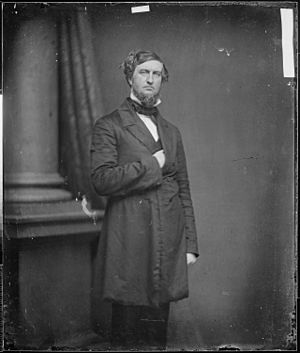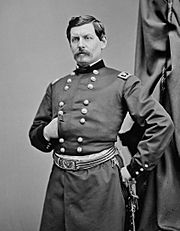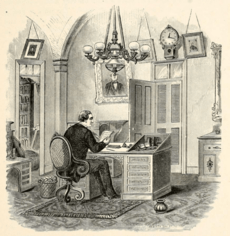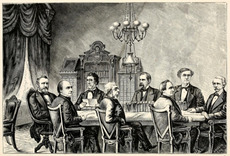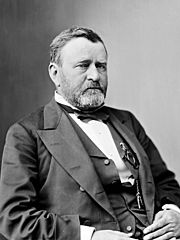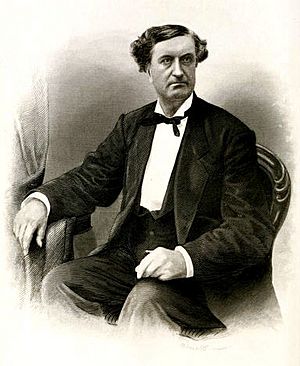Zachariah Chandler facts for kids
Quick facts for kids
Zachariah Chandler
|
|
|---|---|
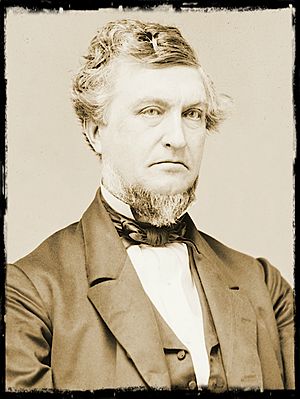 |
|
| United States Senator from Michigan |
|
| In office February 22, 1879 – November 1, 1879 |
|
| Preceded by | Isaac P. Christiancy |
| Succeeded by | Henry P. Baldwin |
| In office March 4, 1857 – March 3, 1875 |
|
| Preceded by | Lewis Cass |
| Succeeded by | Isaac P. Christiancy |
| Chair of the Republican National Committee | |
| In office June 1876 – November 1, 1879 |
|
| Preceded by | Edwin D. Morgan |
| Succeeded by | J. Donald Cameron |
| 12th United States Secretary of the Interior | |
| In office October 19, 1875 – March 11, 1877 |
|
| President | Ulysses S. Grant Rutherford B. Hayes |
| Preceded by | Columbus Delano |
| Succeeded by | Carl Schurz |
| Mayor of Detroit | |
| In office 1851–1852 |
|
| Preceded by | John Ladue |
| Succeeded by | John H. Harmon |
| Personal details | |
| Born | December 10, 1813 Bedford, New Hampshire, U.S. |
| Died | November 1, 1879 (aged 65) Chicago, Illinois, U.S. |
| Political party | Whig (before 1854) Republican (1854–1879) |
| Spouse | Letitia Douglas |
| Signature | |
Zachariah Chandler (December 10, 1813 – November 1, 1879) was an American businessman and important politician. He was one of the people who helped start the Republican Party. Chandler was strongly against slavery his whole life. He served as Mayor of Detroit, a U.S. Senator for Michigan for many years, and later as Secretary of the Interior under President Ulysses S. Grant.
As a young and successful businessman in Detroit, Chandler supported the Underground Railroad, which helped enslaved people escape to freedom. During the Civil War, he strongly supported the Union's efforts, the end of slavery, and equal rights for formerly enslaved African Americans. As Secretary of the Interior, he worked hard to stop corruption, especially in the Bureau of Indian Affairs. He fully supported President Grant's plan to help Native American tribes. In 1879, he was elected U.S. Senator again. He was even considered as a possible candidate for president, but he sadly passed away the morning after giving a speech in Chicago.
Contents
Early Life and Business Career
Zachariah Chandler was born in Bedford, New Hampshire, on December 10, 1813. His parents were Samuel Chandler and Margaret Orr. He went to local schools. After finishing school, Chandler decided not to go to college. Instead, he moved west in 1833 to Detroit, which was then the capital of Michigan Territory.
In Detroit, Chandler opened a general store. He became very successful through trading, banking, and buying and selling land. He grew to be one of the richest people in Michigan.
Family Life and Marriage
On December 10, 1844, Zachariah Chandler married Letitia Grace Douglas. She was from Baltimore, but had moved to New York. Letitia was known for being a good host and lived in Washington D.C. during the winters while Chandler was working there.
Chandler and Letitia had one daughter, Mary Douglas Chandler. Mary later married Senator Eugene Hale from Maine. Their grandchildren included Frederick Hale, who also became a U.S. Senator, and Chandler Hale, a U.S. diplomat. Letitia was known as a kind and gentle person. She passed away on February 19, 1899.
Start of Political Career
From a young age, Chandler was strongly against slavery. He hoped the Whig Party in the North could stop slavery from spreading into new Western territories. Chandler also gave money to support the Detroit Underground Railroad. This secret network helped runaway slaves find safety and freedom.
In 1848, Chandler began his political journey. He gave speeches to support the Whig Party's presidential candidate, Zachary Taylor. In 1851, Chandler was elected Mayor of Detroit and served for one year. In 1852, he ran for Governor of Michigan as a Whig, but he lost the election.
Founding the Republican Party
Chandler believed that Kansas should be a free state, meaning no slavery. He signed a petition that led to the creation of the Republican Party on July 6, 1854. In 1856, Chandler was a delegate at the first Republican Party National Convention in Pittsburgh, Pennsylvania. He also became a member of the Republican National Committee.
The Republican Convention that year chose John C. Frémont as their presidential candidate. Frémont wanted to end slavery in Kansas and opposed the repeal of the Missouri Compromise. Chandler was known as one of the Radical Republicans. This group pushed for stronger actions against the Southern states after the Civil War and more rights for African Americans.
Serving as U.S. Senator (1857–1875)
In January 1857, Chandler was elected as a U.S. Senator for Michigan as a Republican. He took over from Lewis Cass. Chandler was re-elected two more times, serving from March 4, 1857, to March 3, 1875. During his time in the Senate, Chandler joined the anti-slavery Radical Republicans. He was one of the strongest voices against states leaving the Union (secession).
From March 1861 to 1875, Chandler was the chairman of the Committee on Commerce. This committee controlled important funding for rivers and harbors. When the Civil War began, Chandler used his influence as a Senator to help raise and equip volunteer soldiers from Michigan. He was also part of the Joint Committee on the Conduct of the War.
Criticizing General McClellan
On July 6, 1862, Chandler gave a speech in Jackson, Michigan, where he strongly criticized General George B. McClellan for how he was leading the war. Chandler felt this speech was one of his most important public services. His criticism came shortly after McClellan failed to capture Richmond and retreated during the Seven Days Battles, which was a Confederate victory.
Chandler also wrote laws to help the Union during the war. On March 3, 1863, he wrote a law for collecting and managing property left behind in the South. On July 2, 1864, he wrote a law to control interactions with the Confederate states.
Economic and Reconstruction Views
Chandler supported higher taxes on imported goods (tariffs) and the creation of a national bank. He voted for "greenbacks" (paper money) as an emergency measure during the war. However, he was against anything that would cause inflation (money losing its value).
Chandler supported the Reconstruction Acts, which gave civil rights to African Americans. But he felt that Reconstruction was not strict enough on the Southern states. He also pushed for Great Britain to pay for damages caused by Confederate warships built in British ports, like the CSS Alabama. These ships hurt Union trade during the war.
Political Influence
Throughout his time as Senator, Chandler used his power to appoint people to federal jobs. This helped him gain more political power. Some people thought his methods were very partisan and controlling, even if not truly corrupt. For many years, Chandler was the undisputed leader of the Republican Party in Michigan. However, a big win for the Democratic Party in the 1874 election weakened his power. He lost his bid for a fourth term as Senator to Isaac P. Christiancy.
Secretary of Interior (1875–1877)
President Ulysses S. Grant appointed Chandler as Secretary of the Interior in October 1875. He served until 1877. President Grant wanted to fix problems in the department, and Chandler followed his recommendations. He made many reforms and reorganized the Department of Interior. The previous Secretary, Columbus Delano, had allowed corruption to spread.
Secretary Chandler fired corrupt agents in the Bureau of Indian Affairs. He also fired and replaced the Indian Commissioner and a Bureau Clerk. Additionally, Secretary Chandler banned "Indian Attorneys" from the Interior Department. These were people who tricked Native American tribes into paying them for fake representation in Washington D.C. Secretary Chandler fully supported President Grant's "Peace Policy," which aimed to help Native American tribes adopt American ways of life.
Reforming the Bureau of Indian Affairs
When Chandler started his job, he found the Bureau of Indian Affairs to be the most corrupt part of his department. He quietly investigated and found corrupt officials and suspicious activities. Chandler wanted to remove them, but the new Commissioner said these people were essential. So, Chandler held off on firing them.
President Grant was watching Chandler's work closely. He asked Chandler why the corrupt clerks had not been fired. Chandler explained that the Commissioner felt he couldn't run the Bureau without them. Grant then ordered Chandler to fire the corrupt clerks, even if it meant shutting down the Bureau. Chandler immediately went to the Bureau and made sure the suspected clerks were fired. This was the only time Grant directly got involved in reforming a federal department, and he continued to support Chandler's efforts.
Other Department Reforms
Besides the Bureau of Indian Affairs, Chandler also investigated the Pension Bureau. This investigation found many fake claims, which saved the government hundreds of thousands of dollars. Within a month, Chandler fired all Pension Bureau clerks involved in corruption.
Chandler also had his assistants investigate the Land Office. They found a corrupt group involved in "Chippewa half-breed scrip" profiteering. Chandler broke up this group and fired everyone connected to it.
Reforming the Patent Office
During his first month, Chandler fired all the clerks in one room of the Patent Office. He believed they were all involved in corruption or lacked integrity. He emptied the room and put an African American porter in charge of locking it until honest replacements could be found. Chandler ignored complaints and warned anyone who felt unfairly fired not to go to the press.
Chandler also started a surprise investigation. He put a new officer in charge of monthly payrolls, collecting full names and addresses of everyone who signed them. They found almost twenty fake employees, created by a group to steal federal money. Chandler also exposed and removed unqualified clerks who made money by hiring cheaper replacements to do their work. Chandler made the rules for getting patents simpler, making them easier and cheaper for the public.
Banning "Indian Attorneys"
In December 1875, Chandler banned "Indian Attorneys" from the Department of Interior. These were people who claimed to represent Native Americans in Washington. These fake "agents" tricked tribes into paying them large amounts of money for supposed legislative help. They would also use Indian land agreements as security for payments. They scared Native Americans by saying their tribal rights would be taken away if they didn't use their services.
Chandler stopped payments to these men, saying their claims were illegal and wrong. He stated that the official Indian Agent, the Commissioner of Indian Affairs, and the Secretary of Interior were fully capable of protecting Native American rights. Chandler's ban saved Native American tribes a lot of money.
Republican Party Leadership
As Chairman of the Republican National Committee, Chandler successfully managed Rutherford B. Hayes' campaign for president in 1876. However, Hayes chose not to keep Chandler as Secretary of the Interior. Chandler later became Chairman of the Michigan Republican Party in 1878.
Return to the U.S. Senate (1879)
In 1879, Zachariah Chandler was elected to the Senate again. He filled the spot left empty by Isaac P. Christiancy, who had replaced him just four years earlier. He served in the Senate from February 22, 1879, until his death later that year.
Last Speech and Passing
Party leaders were considering Chandler as a possible candidate for the 1880 presidential election. On October 31, 1879, he went to Chicago to give a political speech. He spoke to an African American Young Men's Republican Auxiliary Club at McCormick Hall. Chandler, still holding his "Radical" beliefs, said he hoped that one day African Americans would be able to vote freely and safely, run for office, and give speeches across the nation, including in the South. He noted that former rebels were allowed to do these things in the North.
Even though he had a cold, he seemed strong and healthy that day. The next morning, November 1, 1879, he was found dead in his room at the Grand Pacific Hotel at 7:00 AM. He was resting on his bed. Zachariah Chandler is buried at Elmwood Cemetery in Detroit.
Historical Importance
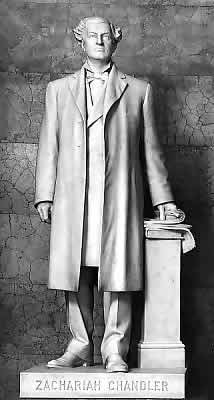
When President Grant appointed Chandler as Secretary of Interior in 1875, some people were worried. They thought corruption and favoritism might continue in the department, as they had under the previous Secretary, Columbus Delano. Chandler was known as a wealthy Republican political leader, not necessarily a reformer.
However, these worries turned out to be wrong. Chandler proved to be a very effective reformer. He investigated corruption in his department and reported to President Grant, who gave him permission to start reforms. He fired many people in the department who were involved in corruption and fraud. He also removed people known as "Indian Attorneys," who were cheating Native American tribes. Chandler's work helped clean up the Department of Interior.
See also
- List of United States Congress members who died in office (1790–1899)
 | Selma Burke |
 | Pauline Powell Burns |
 | Frederick J. Brown |
 | Robert Blackburn |


